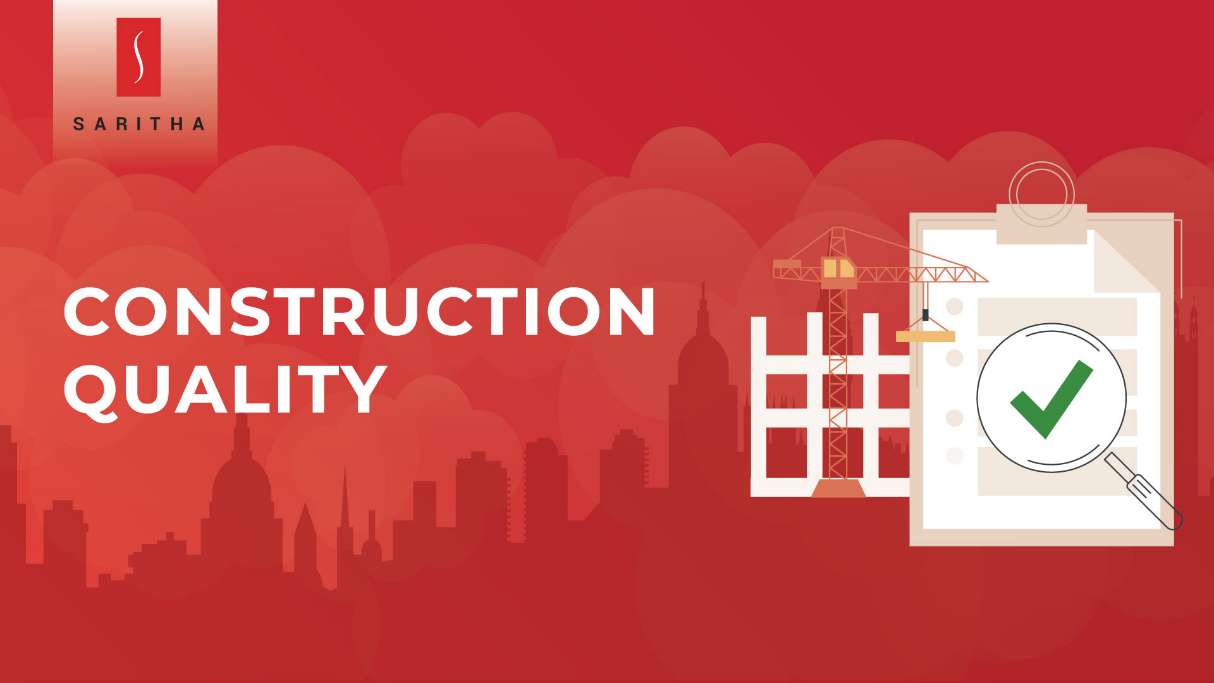When investing in real estate—be it a humble 1 BHK apartment or a luxurious villa—most homebuyers understandably focus on location, amenities, layout, and budget. Yet, the most crucial factor that often gets overlooked is construction quality. A property’s construction quality directly affects its durability, safety, long-term maintenance costs, and resale value. No matter how aesthetically pleasing a home appears, poor construction can result in water leakages, cracks, uneven flooring, structural instability, and much worse over time.
In this comprehensive blog, we dive deep into the world of construction quality in real estate. From understanding how to check build quality to identifying whether a builder is genuine, we’ll walk you through every essential factor you need to know before putting your hard-earned money into a property.
Also Read:- Property Tax Pune Municipal Corporation: Online | Receipt | News
What Is Construction Quality in Real Estate?
Construction quality refers to the overall standard of workmanship, materials, and processes used in building a structure. High construction quality ensures that the building meets structural and architectural standards, adheres to safety norms, and provides long-term value to the homeowner.
It is not just about the strength of the walls or the shine of the flooring—it encompasses everything from foundation quality, RCC (Reinforced Cement Concrete) work, water and electric fittings, to ventilation and noise insulation.
Why Is Quality So Important in Construction?

- Construction quality is vital because it ensures the safety and longevity of a building.
- A well-constructed building is structurally sound, reduces future maintenance costs, enhances property value, and offers better living conditions.
- In regions like Mumbai, where climatic conditions include high rainfall and humidity, poor construction quality can lead to mold, leakage, or even collapse.
- Better construction reduces liability for developers and ensures consumer trust in the long run.
Also Read:- Leela Palace Chennai – Seaside Modern Palace Hotel
How to Measure Construction Quality?
Assessing construction quality requires both on-site inspection and documentation analysis. Here’s how you can do it:
- Visual Inspection: Check for wall cracks, damp patches, uneven tile placement, and hollow-sounding walls when tapped.
- Material Checks: Confirm that branded cement, steel, tiles, and plumbing materials have been used.
- RCC Quality: Request for cube test reports for concrete, which show if the mix meets strength requirements.
- Soil Testing: Ask if the developer has done a soil test before laying the foundation.
- Third-Party Certifications: Check if the project is audited by a quality assurance firm or has certifications like ISO 9001.
How to Check RCC Quality?

RCC, or Reinforced Cement Concrete, is the backbone of any structure. Here’s how to verify its quality:
- Ask for the concrete cube test results that builders conduct to assess the compressive strength of the RCC mix.
- Inspect the curing process. Proper curing (wetting of cement) should continue for at least 7 to 10 days after casting.
- Check if the formwork is tight and leak-proof to avoid honeycombing in beams and slabs.
- Reinforcement bars should be rust-free and properly placed with sufficient concrete cover.
How to Check Construction Quality of a House?

For a ready-to-move-in home, checking quality is even more critical:
- Examine wall finishes—uneven patches, cracks, or dampness are red flags.
- Open and shut all doors and windows to check alignment and smooth operation.
- Look at plumbing—are there water stains under the sink or damp ceilings?
- Flush toilets and open taps to check pressure and drainage.
- Switch on lights to test the electrical network—flickering lights indicate faulty wiring.
Also Read:- Mukesh Ambani House: Address | Price | Interior | Trending news
How to Check Build Quality in an Under-Construction Project?

- Visit the site regularly during construction stages.
- Observe how materials are stored—are they protected from moisture?
- Talk to construction workers about daily processes and safety standards.
- Ask the builder about their construction timeline and quality control procedures.
- If possible, bring an independent civil engineer to inspect the site.
What Is the Construction Quality Management?

Construction Quality Management (CQM) is a systematic approach adopted by builders to ensure each stage of construction adheres to specified quality benchmarks.
It involves:
- Planning: Identifying quality standards and project objectives.
- Control: Monitoring material quality, worker competency, and process adherence.
- Assurance: Regular inspections and third-party audits.
- Improvement: Learning from on-site feedback and rectifying flaws for future stages.
What Is Quality Assurance in Real Estate?

Quality assurance in real estate means ensuring that all construction-related processes—from foundation to finish—follow pre-defined quality norms and building codes.
It typically involves:
- Internal quality checks at each stage.
- Material certifications.
- Detailed documentation and testing.
- Ensuring workers and supervisors are trained and certified.
What Is TQM in Construction?

TQM stands for Total Quality Management. In construction, it refers to an organization-wide effort to build quality into every process rather than just checking it after execution.
TQM principles include:
- Continuous improvement.
- Involvement of all team members—from contractors to supervisors.
- Strong customer focus.
- Data-driven decision-making to prevent issues rather than fix them.
What Are the 4 Types of Quality Control in Construction?
- Preventive Control: Set procedures to avoid defects.
- Corrective Control: Fix issues when they occur.
- Detective Control: Identify issues through inspections.
- Directive Control: Guide teams with manuals and protocols.
What Are the 4 Main Types of Construction?
Understanding construction types helps you evaluate durability and risk:
- Residential Construction: Includes apartments, villas, and townhouses.
- Commercial Construction: Office buildings, malls, hotels.
- Industrial Construction: Factories, warehouses.
- Infrastructure Construction: Roads, bridges, metro, etc.
What Are the 6 Types of Construction Classifications?
- Type I – Fire-resistive (high-rises).
- Type II – Non-combustible (commercial properties).
- Type III – Ordinary (residential with brick/wood).
- Type IV – Heavy timber (older buildings).
- Type V – Wood-frame (common homes).
- Pre-engineered – Factories, sheds with steel structure.
How to Know if a Builder Is Genuine?
- Check their RERA registration and past project records.
- Visit previous projects and ask homeowners about quality and delivery.
- Look for ISO or other quality certifications.
- Read online reviews and news mentions—watch for delays or fraud.
- Genuine builders are transparent with approvals, legal papers, and construction schedules.
Conclusion: Build Your Future on a Strong Foundation
In a real estate market filled with glossy brochures and marketing gimmicks, construction quality is your best defense against future disappointments. Whether you’re buying for personal use or investment, the strength, safety, and finish of the construction are what truly determine the long-term value of your purchase. Always be vigilant, ask questions, verify documents, and never hesitate to hire a third-party inspector if you have doubts.
At Housiey, we connect buyers directly with verified builders and offer transparent information about each project’s construction practices. For a smarter, safer home-buying journey, trust a platform that prioritizes your peace of mind.
Curious about taxes on commercial property investments? Read our in-depth blog on “GST on Commercial Properties” now!
FAQs
When investing in real estate—be it a humble 1 BHK apartment or a luxurious villa—most homebuyers understandably focus on location, amenities, layout, and budget. Yet, the most crucial factor that often gets overlooked is construction quality. A property’s construction quality directly affects its durability, safety, long-term maintenance costs, and resale value. No matter how aesthetically pleasing a home appears, poor construction can result in water leakages, cracks, uneven flooring, structural instability, and much worse over time.
In this comprehensive blog, we dive deep into the world of construction quality in real estate. From understanding how to check build quality to identifying whether a builder is genuine, we’ll walk you through every essential factor you need to know before putting your hard-earned money into a property.
Also Read:- Property Tax Pune Municipal Corporation: Online | Receipt | News
What Is Construction Quality in Real Estate?
Construction quality refers to the overall standard of workmanship, materials, and processes used in building a structure. High construction quality ensures that the building meets structural and architectural standards, adheres to safety norms, and provides long-term value to the homeowner.
It is not just about the strength of the walls or the shine of the flooring—it encompasses everything from foundation quality, RCC (Reinforced Cement Concrete) work, water and electric fittings, to ventilation and noise insulation.
Why Is Quality So Important in Construction?

- Construction quality is vital because it ensures the safety and longevity of a building.
- A well-constructed building is structurally sound, reduces future maintenance costs, enhances property value, and offers better living conditions.
- In regions like Mumbai, where climatic conditions include high rainfall and humidity, poor construction quality can lead to mold, leakage, or even collapse.
- Better construction reduces liability for developers and ensures consumer trust in the long run.
Also Read:- Leela Palace Chennai – Seaside Modern Palace Hotel
How to Measure Construction Quality?
Assessing construction quality requires both on-site inspection and documentation analysis. Here’s how you can do it:
- Visual Inspection: Check for wall cracks, damp patches, uneven tile placement, and hollow-sounding walls when tapped.
- Material Checks: Confirm that branded cement, steel, tiles, and plumbing materials have been used.
- RCC Quality: Request for cube test reports for concrete, which show if the mix meets strength requirements.
- Soil Testing: Ask if the developer has done a soil test before laying the foundation.
- Third-Party Certifications: Check if the project is audited by a quality assurance firm or has certifications like ISO 9001.
How to Check RCC Quality?

RCC, or Reinforced Cement Concrete, is the backbone of any structure. Here’s how to verify its quality:
- Ask for the concrete cube test results that builders conduct to assess the compressive strength of the RCC mix.
- Inspect the curing process. Proper curing (wetting of cement) should continue for at least 7 to 10 days after casting.
- Check if the formwork is tight and leak-proof to avoid honeycombing in beams and slabs.
- Reinforcement bars should be rust-free and properly placed with sufficient concrete cover.
How to Check Construction Quality of a House?

For a ready-to-move-in home, checking quality is even more critical:
- Examine wall finishes—uneven patches, cracks, or dampness are red flags.
- Open and shut all doors and windows to check alignment and smooth operation.
- Look at plumbing—are there water stains under the sink or damp ceilings?
- Flush toilets and open taps to check pressure and drainage.
- Switch on lights to test the electrical network—flickering lights indicate faulty wiring.
Also Read:- Mukesh Ambani House: Address | Price | Interior | Trending news
How to Check Build Quality in an Under-Construction Project?

- Visit the site regularly during construction stages.
- Observe how materials are stored—are they protected from moisture?
- Talk to construction workers about daily processes and safety standards.
- Ask the builder about their construction timeline and quality control procedures.
- If possible, bring an independent civil engineer to inspect the site.
What Is the Construction Quality Management?

Construction Quality Management (CQM) is a systematic approach adopted by builders to ensure each stage of construction adheres to specified quality benchmarks.
It involves:
- Planning: Identifying quality standards and project objectives.
- Control: Monitoring material quality, worker competency, and process adherence.
- Assurance: Regular inspections and third-party audits.
- Improvement: Learning from on-site feedback and rectifying flaws for future stages.
What Is Quality Assurance in Real Estate?

Quality assurance in real estate means ensuring that all construction-related processes—from foundation to finish—follow pre-defined quality norms and building codes.
It typically involves:
- Internal quality checks at each stage.
- Material certifications.
- Detailed documentation and testing.
- Ensuring workers and supervisors are trained and certified.
What Is TQM in Construction?

TQM stands for Total Quality Management. In construction, it refers to an organization-wide effort to build quality into every process rather than just checking it after execution.
TQM principles include:
- Continuous improvement.
- Involvement of all team members—from contractors to supervisors.
- Strong customer focus.
- Data-driven decision-making to prevent issues rather than fix them.
What Are the 4 Types of Quality Control in Construction?
- Preventive Control: Set procedures to avoid defects.
- Corrective Control: Fix issues when they occur.
- Detective Control: Identify issues through inspections.
- Directive Control: Guide teams with manuals and protocols.
What Are the 4 Main Types of Construction?
Understanding construction types helps you evaluate durability and risk:
- Residential Construction: Includes apartments, villas, and townhouses.
- Commercial Construction: Office buildings, malls, hotels.
- Industrial Construction: Factories, warehouses.
- Infrastructure Construction: Roads, bridges, metro, etc.
What Are the 6 Types of Construction Classifications?
- Type I – Fire-resistive (high-rises).
- Type II – Non-combustible (commercial properties).
- Type III – Ordinary (residential with brick/wood).
- Type IV – Heavy timber (older buildings).
- Type V – Wood-frame (common homes).
- Pre-engineered – Factories, sheds with steel structure.
How to Know if a Builder Is Genuine?
- Check their RERA registration and past project records.
- Visit previous projects and ask homeowners about quality and delivery.
- Look for ISO or other quality certifications.
- Read online reviews and news mentions—watch for delays or fraud.
- Genuine builders are transparent with approvals, legal papers, and construction schedules.
Conclusion: Build Your Future on a Strong Foundation
In a real estate market filled with glossy brochures and marketing gimmicks, construction quality is your best defense against future disappointments. Whether you’re buying for personal use or investment, the strength, safety, and finish of the construction are what truly determine the long-term value of your purchase. Always be vigilant, ask questions, verify documents, and never hesitate to hire a third-party inspector if you have doubts.
At Housiey, we connect buyers directly with verified builders and offer transparent information about each project’s construction practices. For a smarter, safer home-buying journey, trust a platform that prioritizes your peace of mind.
Curious about taxes on commercial property investments? Read our in-depth blog on “GST on Commercial Properties” now!
FAQs














